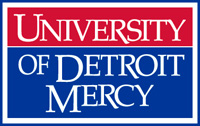Organization’s Social Mission
The University of Detroit Mercy, a Catholic university in the Jesuit and Mercy traditions, exists to provide excellent student-centered undergraduate and graduate education in an urban context. A UDM education seeks to integrate the intellectual, spiritual, ethical and social development of our students.
Green Initiatives
Advanced Electric Vehicles Graduate Certificate
The University of Detroit Mercy’s College of Engineering and Science offers an Advanced Electric Vehicles (AEV) Graduate Certificate Program.
The AEV program was designed to educate and retrain traditional automotive engineers, providing them with the skills and expertise to develop the next generation of advanced electric and hybrid vehicles.
Courses include: Introduction to AEVs, Electric Drives/Electromechanical Energy Conversion, Controls Modeling & Design for AEVs, Systems Engineering for AEVs, Systems Engineering for AEVs, Innovation and Systems Architecture for AEVs, Energy Storage Systems/Battery Technologies and Power Electronics for Electric Vehicles.
Since electric vehicles are becoming more and more popular, this certificate helps students be more marketable and knowledgeable in the field thus, helping our environment.
Community Development Program
University of Detroit Mercy’s graduate program in Community Development takes a unique approach to the theory and practice of building sustainable communities.
The Master of Community Development (MCD) is an interdisciplinary program, integrating human, organizational, physical and economic development into its core curriculum. Housed in the School of Architecture, the MCD offer concentration course work through all Colleges and Schools within UDM.
Graduates of the MCD program become leaders in the field of Community Development and will be recognized as experts in sustainable community development in the public, private, corporate, not-for-profit and institutional sectors.
Graduate students and faculty partner with community organizations to develop sustainable neighborhood projects in Detroit and southeastern Michigan. Service, social justice, and sustainability comprise a three-part philosophical and ethical foundation of the MCD program. Each of these concepts are unique, yet inter-related, and together provide the ideological base that fosters the development of leaders in community development that: possess a value system that recognizes and promotes the growth of all individuals, are holistic in their approach to community development, and are motivated by a constant need to enhance and achieve communities that are self-sustaining and just.
Service is an integral part of the University of Detroit Mercy tradition drawing from the Mission to integrate the intellectual, spiritual, ethical, and social development of our students. Service opportunities involve learning through doing, helping others, meeting the needs of a community, and working collaboratively with others to accomplish common goals. Service opportunities complement classroom experiences and provide a wealth of potential growth benefits to the student including:
* increased awareness of special needs
* adopting new perspectives on communities and resources
* opportunities to effect change and make a difference in local communities
* opportunities to meet personal intrinsic needs
* opportunities to actively apply the skills of social justice
* a competitive edge towards entering the workforce as a servant leader
Directly related to service and equally significant to the Mission of the University is the concept of Social Justice. Social justice is based upon the notion that all individuals deserve equitable access and treatment in regard to society’s rights, opportunities, and amenities; planning and development should be constituent based; and injustice and discrimination must be addressed and rectified. In a society with a profound history of injustice, in order to truly measure equality, the concept of social justice also demands a commitment to real tangible results as a measure of effective action. As such, social justice requires increased awareness of community problems, most especially those stemming from inequities and forms of oppression, and active engagement in addressing such issues. Social Justice integrates increased knowledge with the tools necessary for advocacy and social action. Social justice is integrated across the curriculum in the MCD program providing students with a deepened understanding and appreciation of issues of inequities and injustice that prohibit inclusive and effective community development, and with the tools to actively begin to engage in a life committed to social justice.
The final component of the ideological foundation is also integral to the University Mission and the Program Mission. Sustainability literally deals with the long term health of a given community; what will the future effects of a given initiative be in terms of human, economic, and physical resources? Sustainability as a core philosophy establishes a goal of healthy impacts that reach beyond the immediate concerns of any situation. This would include the impact that may be felt in physical areas beyond the scope of a given development, as well as the impacts on future communities and their ability to continue to thrive. Traditionally the concept of sustainability is articulated by three primary components; economic, social (human), and environmental (physical) sustainability. In order to prepare students to become active change agents within this three part matrix, the program adds a fourth category: organizational sustainability, which addresses process issues specific to community development organizations. Borrowing the ecological understanding of environments from the natural sciences and applying it to the built environment, the concept of sustainability as exemplified in the MCD curriculum stresses the importance of a systems understanding of community development. Individual organisms do not function, and cannot be studied as independent entities isolated from other organisms and their habitat. Likewise, a foundational concept in the MCD program is the idea that communities cannot be built (or studied) without considering the complex interrelationships between human, economic, physical and organizational forces that together create whole communities. It is in this core value of sustainability that we find the roots of the program’s ambition to develop leaders who will have the appropriate knowledge, skills and values to create truly livable communities. It is also the concept from which the program takes its distinctive approach to interdisciplinary development.
For comments about the program, please refer to http://www.udmercy.edu/mcd/professionals-comments/index.htm.
View the Master Of Community Development requirements.


